The well-orchestrated March 2015 visit to Washington by President of Afghanistan Ashraf Ghani and Chief Executive Abdullah Abdullah appeared to be a major success, and probably fulfilled most of the goals of the Afghan side. Their repeated expressions of gratitude for U.S. assistance and sacrifices, in sharp contrast with the recent past, built good feeling everywhere they went. An address to a Joint Session of Congress, upbeat meetings with the administration, and press and think-tank contacts seemed to bolster interest in Afghanistan that had been dropping in recent years.
In extended meetings with Secretaries John Kerry and Ashton Carter and President Barack Obama, the heads of Afghanistan's National Unity Government (NUG) obtained the agreement of the U.S. administration that the number of troops currently in the train advise and assist mission would remain steady at 9800 military personnel through the end of 2015. It had previously been scheduled to drop to nearly half by then.
Beyond that, Obama made clear his continuing determination that nearly all forces except a small contingent stationed at the embassy would depart by the end of his term at the end of 2016. The Afghans carefully chose not to publicly dispute this now, but offered no indication that they could support such rapid full withdrawal. In any event, they have bought close to another year in which to make a case for an extended presence, to a time when the decision may be affected by the views of the candidates running to succeed Obama, and who would have to deal with the potential consequences of a premature withdrawal.The case for staying post-2016, widely backed by foreign policy experts, was argued in an open letter sent before the visit to Obama from former officials including ex-National Security Advisers from both parties.
Ghani, along with Abdullah, appeared to have succeeded in nailing down continued U.S. financial support for the Afghan security services at least for two years. In addition, they got promises of continuing economic support and may have slowed the attenuation of aid budgets. A commitment of $800 million USD was announced to be channeled via the Afghan Reconstruction Trust Fund to be expended by the government, half already in the 2014U.S. budget the rest to be appropriated in the 2015 and 2016 budgets. The Afghan Fulbright program would be expanded by half.
Ghani also used his Washington time to host a dinner at Blair House for the heads of the World Bank and IMF and UN leaders. This likely led to declarations of continued support on the behalf of the international community.
Atmospherically, it would seem that the visit was a real triumph. The two leaders of the National Unity government were welcomed at the highest levels with protocol and hospitality exceeding all but a formal state visit. The leaders met with President Obama at the White House, followed by a generally upbeat press conference with Ghani.
The Afghan leaders dined at the home of defense secretary Ash Carter and were hosted by Secretary of State Kerry at a formal dinner at the State Department following a full day of meetings at Camp David that were also attended by Treasury Secretary Lew. Body language in meeting photos was very warm and positive.
The unanticipated address of President Ghani to a joint session of Congress appeared to be a triumph. The speech was repeatedly interrupted by applause including many standing ovations from both sides of the partisan aisle. Ghani, over and over again, thanked the United States, its soldiers, diplomats and aid workers, by name both military commanders (known to the public) and ambassadors. Ghani invoked the threat of Islamic extremism and DAESH (Islamic State)along with al-Qaeda and foreign terrorists in Afghanistan and the Pakistan borderlands. He declared that Afghanistan would be resolute in the fight against terrorism and that it would win, and was cheered for it. Ghani pledged that Afghanistan would be self-sufficient within a decade. He noted the appointment of four women to cabinet and dwelled on Afghan determination to pursue and protect the rights of women. All of these points seemed to win both the hearts and minds of both parties in Congress, in what may have been the warmest event there in years. Ghani's engaged personal manner of greeting individual members also won support. No doubt Congress as a whole will be more sympathetic to Afghanistan-related issues and requests than before.
In an address to the United States Institute of Peace, President Ghani noted that the conflict is not fundamentally with the Taliban, but between Pakistan and Afghanistan. Ghani said Pakistan has recently accepted this notion, which he called "a breakthrough." He also focused on the danger of extreme Islamic radicalism posed by DAESH, using this more immediate and ongoing American concern to establish a strong argument to play down the road for continuing U.S. security support for Afghanistan, and perhaps extension of troop presence. In response to a question about transitional justice, Ghani said Afghanistan "cannot sacrifice the future for the sake of the past," noting effort by South Africa and Rwanda.
In a separate appearance at the Brookings Institution, CEO Abdullah noted this point but focused more on the difficulties of the pending peace discussions with the Taliban, who themselves are divided with a leader who has not been seen in well over a year. The NUG has had contacts with unspecified Taliban, but no negotiations. Abdullah said Afghan women would be involved in the negotiations and would not be sold out in any peace agreement. Asked what Afghanistan needed to best defend itself, Abdullah noted the brave performance of the security forces but the ongoing need for coalition-provided enablers, particularly combat air support, evacuation of wounded, transport, and intelligence. Most important would be for Afghan forces to more rapidly receive these capabilities.
Both leaders repeatedly made clear that they are acting as part of a team, and spoke well of each other as occasion arose. They acknowledged shortcomings in performance by the Unity Government and continuing disagreements and differences between them, but indicated that they are able and committed to cooperate in moving the country forward. No doubt their solidarity was amplified for the audience, but in the event, it left a good impression.
Nevertheless, many concerns remain. The NUG leaders' pledges on corruption testified to the continuing preoccupation of their interlocutors on the issue. At the White House press conference, one questioner asked Obama when American troops can know they will be out, underscoring the pressure on the U.S. president to stick to his withdrawal plans. The New York Times, after a session with President Ghani, opined that his argument was "convincing," but Obama's decision to slow the withdrawal, "should not be an excuse for keeping troops in Afghanistan indefinitely."
Several indicators, including relatively moderate media coverage, suggest that the importance of Afghanistan in the American geo-political mindset remains on the downswing. Regardless, this visit shows that it still remains agenuine concern to American policymakers, bolstered by a significant group of "friends," in sharp contrast to the falloff of interest in the 1990s.
Projecting a consistent image of harmony, Ghani and Abdullah succeeded in turning around a negative impression about Afghan leadership, of some years standing among many in Washington. In an often harsh U.S. political environment, the Afghan leaders faced little open criticism. Theirvisit will smooth the way for flourishing cooperation in the years to come. But, now well-seeded, it is a garden that will have to be carefully tended.



Comment this post